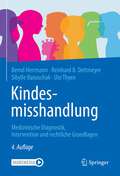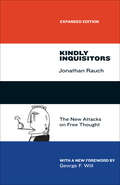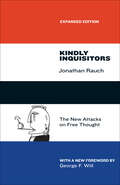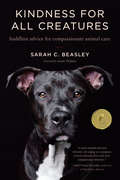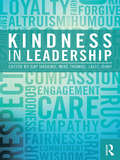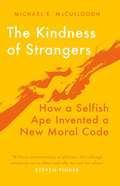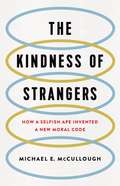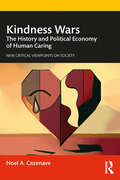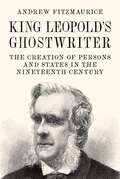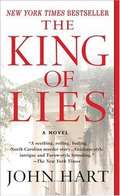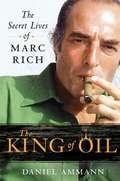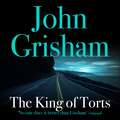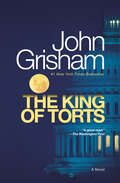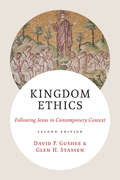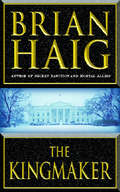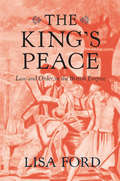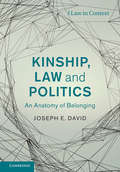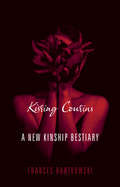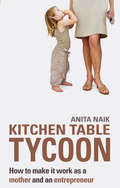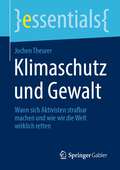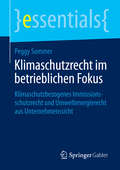- Table View
- List View
Kind and Unusual Punishment: The Prison Business
by Jessica MitfordJessica Mitford gives an in-depth analysis of how prisons function in society.
Kinder als „Ersatzteillieferanten“ im rechtlichen Kontext: Von der Nabelschnurblutspende zur Selektion von Retterkindern (Veröffentlichungen des Instituts für Deutsches, Europäisches und Internationales Medizinrecht, Gesundheitsrecht und Bioethik der Universitäten Heidelberg und Mannheim #50)
by Alena JerrentrupIn einer erstmaligen Gesamtdarstellung widmet sich dieses Buch der Frage, ob und gegebenenfalls inwieweit es zulässig ist, Kinder als Spender von Körperbestandteilen heranzuziehen oder sogar eigens zu diesem Zweck zu zeugen. Den Ausgangspunkt bildet dabei das Spannungsverhältnis, dass die Kinder zwar zunächst den Befugnissen der Eltern unterstehen, diese jedoch die kindlichen Interessen nicht unberücksichtigt lassen dürfen und elterliche Entscheidungsbefugnisse überdies mit Heranwachsen des Kindes zunehmend in den Hintergrund treten müssen. Die je nach Spendekonstellation unterschiedlich intensiven Eingriffe in die kindlichen Rechte, aber auch die verschiedenen Abstufungen eines möglichen Nutzens für das Spenderkind werden herausgearbeitet und mit Blick auf ihre medizinischen, ethischen und rechtlichen Implikationen analysiert. Zudem wird geprüft, ob in Deutschland derzeit eine widerspruchsfreie Rechtslage hinsichtlich der Erlaubnis respektive des Verbots einzelner Spendeformen durch Kinder existiert oder Handlungs- bzw. Harmonisierungsbedarf besteht. Die untersuchten Rechtsgebiete erstrecken sich vom Medizin- über das Zivil-, hier insbesondere das Familienrecht, bis hin zum Verfassungsrecht; der thematische Bogen reicht dabei von Neugeborenen bis Jugendlichen, Eigen- bis Fremdspenden, Blut- bis Organspenden und schließlich bis hin zur höchst umstrittenen Selektion sog. „Retterkinder” mittels PID.
Kindesmisshandlung: Medizinische Diagnostik, Intervention und rechtliche Grundlagen
by Bernd Herrmann Reinhard B. Dettmeyer Sibylle Banaschak Ute ThyenDas bewährte Fachbuch zum Kinderschutz in der Medizin bietet Strategien für den Umgang mit Verdachtsfällen von Kindesmisshandlung und -vernachlässigung, fundierte fachliche Grundlagen für die Diagnose, Sicherheit in Rechtsfragen und erprobte Konzepte für die Intervention. Fundierte somatische Diagnostik Leitliniengerecht, hohe EvidenzRationale diagnostische StrategienForensische BefundsicherungKinder- und jugendgynäkologische Grundlagen Umsichtige Intervention & Prävention Gesprächsführung mit Eltern, Kindern und JugendlichenInterdisziplinäre Netzwerke schaffen und nutzenFrühe Hilfen und KinderschutzSchutzkonzepte für den Umgang mit Missbrauch in Institutionen Gesellschaftliche und rechtliche Grundlagen Auszüge wichtigster GesetzeGesetzlicher Opferschutz, psychosoziale Folgen Kompakt und praxisrelevant Korrekte Anamnese und DokumentationMerkblätter, Checklisten, InternetadressenPraxistipps, Differenzialdiagnosen und Fallstricke Vom „unguten Gefühl“ zu evidenzbasiertem Handeln. Unter Berücksichtigung der aktuellen Literatur, Gesetze und Rechtsprechung sowie der neuen nationalen AWMF S3+ Kinderschutzleitlinie und internationaler Leitlinien. Das erste deutschsprachige Handbuch für fachgerechte medizinische Diagnostik und Intervention. Das notwendige „Handwerkszeug“ für Ärzte und andere Gesundheitsberufe, um in der täglichen Praxis die richtigen Entscheidungen zu treffen. Als bewährter Leitfaden, Ratgeber und Nachschlagewerk für Ärzte, aber auch alle anderen beteiligten Fachleute im Kinderschutz: Juristen, Polizei, Jugendämter, Beratungsstellen. Mit allen relevanten Inhalten für Basis- und Aufbaukurs des Zertifikatslehrganges Kinderschutzmedizin der Deutschen Gesellschaft für Kinderschutz in der Medizin (DGKiM).Mit eLernkarten „Flashcards“ zur Vorbereitung auf die Zertifikatsprüfung Kinderschutzmedizin der DGKiM.
Kindly Inquisitors: The New Attacks on Free Thought, Expanded Edition
by Jonathan Rauch"A liberal society stands on the proposition that we should all take seriously the idea that we might be wrong. This means we must place no one, including ourselves, beyond the reach of criticism; it means that we must allow people to err, even where the error offends and upsets, as it often will. ” So writes Jonathan Rauch in Kindly Inquisitors, which has challenged readers for more than twenty years with its bracing and provocative exploration of the issues surrounding attempts to limit free speech. In it, Rauch makes a persuasive argument for the value of "liberal science” and the idea that conflicting views produce knowledge within society. In this expanded edition of Kindly Inquisitors, a new foreword by George F. Will strikingly shows the book’s continued relevance, while a substantial new afterword by Rauch elaborates upon his original argument and brings it fully up to date. Two decades after the book’s initial publication, while some progress has been made, the regulation of hate speech has grown domestically--especially in American universities--and has spread even more internationally, where there is no First Amendment to serve as a meaningful check. But the answer to bias and prejudice, Rauch argues, is pluralism--not purism. Rather than attempting to legislate bias and prejudice out of existence or to drive them underground, we must pit them against one another to foster a more vigorous and fruitful discussion. It is this process that has been responsible for the growing acceptance of the moral acceptability of homosexuality over the last twenty years. And it is this process, Rauch argues, that will enable us as a society to replace hate with knowledge, both ethical and empirical. "It is a melancholy fact that this elegant book, which is slender and sharp as a stiletto, is needed, now even more than two decades ago. Armed with it, readers can slice through the pernicious ideas that are producing the still-thickening thicket of rules, codes, and regulations restricting freedom of thought and expression. ”--George F. Will, from the foreword
Kindly Inquisitors: The New Attacks on Free Thought
by Jonathan Rauch“A liberal society stands on the proposition that we should all take seriously the idea that we might be wrong. This means we must place no one, including ourselves, beyond the reach of criticism; it means that we must allow people to err, even where the error offends and upsets, as it often will.” So writes Jonathan Rauch in Kindly Inquisitors, which has challenged readers for more than twenty years with its bracing and provocative exploration of the issues surrounding attempts to limit free speech. In it, Rauch makes a persuasive argument for the value of “liberal science” and the idea that conflicting views produce knowledge within society. In this expanded edition of Kindly Inquisitors, a new foreword by George F. Will strikingly shows the book’s continued relevance, while a substantial new afterword by Rauch elaborates upon his original argument and brings it fully up to date. Two decades after the book’s initial publication, while some progress has been made, the regulation of hate speech has grown domestically—especially in American universities—and has spread even more internationally, where there is no First Amendment to serve as a meaningful check. But the answer to bias and prejudice, Rauch argues, is pluralism—not purism. Rather than attempting to legislate bias and prejudice out of existence or to drive them underground, we must pit them against one another to foster a more vigorous and fruitful discussion. It is this process that has been responsible for the growing acceptance of the moral acceptability of homosexuality over the last twenty years. And it is this process, Rauch argues, that will enable us as a society to replace hate with knowledge, both ethical and empirical. “It is a melancholy fact that this elegant book, which is slender and sharp as a stiletto, is needed, now even more than two decades ago. Armed with it, readers can slice through the pernicious ideas that are producing the still-thickening thicket of rules, codes, and regulations restricting freedom of thought and expression.”—George F. Will, from the foreword
Kindness for All Creatures: Buddhist Advice for Compassionate Animal Care (Trilogy of Rest)
by Sarah C. BeasleyA heartfelt guide to compassionate care for animals from a Buddhist perspective, with practical advice for mindfully raising pets and honoring animals.Are you doing all you can for the well-being of your beloved pet? Is your outlook toward wildlife consistent with your loyalty to cats and dogs? Structured around the Six Perfections of Buddhism, this book explores these questions and more, providing heartfelt guidance on how to apply compassion in action to our relationships with animals. In addition to being a practical resource, it encourages advocacy, challenging us to think more profoundly about caring for the creatures—both domestic and wild—with whom we share our world.
Kindness in Leadership
by Gay Haskins Michael Thomas Lalit JohriIn a global climate of increasing complexity and uncertainty, there have been calls for a more responsible form of leadership in business and society. The relationship between kindness and leadership is therefore a topic of fundamental importance for our well-being as individuals, for the success of our organisations, and for the future of our global community. Kindness in Leadership is one of the first books to explore both the concept and practice of kindness in leadership and consider them in different societal and organisational settings. Its uniqueness lies in combining an innovative mix of personal views from leaders with explorations of organisational philosophies and practices. It opens with a definition of kindness and its contours and underpinnings. It then explores the importance of kindness within different organisations, parts of the world, economic strata, age groups and genders, drawing on research on organisational compassion and neuroscience. In order to support learning, each chapter is supported by a series of questions for consideration and discussion. This will be a stimulating and thought-provoking read for a wide audience of practicing managers and leaders in organisations of all shapes and sizes, for academics involved in educating for leadership, and for students aspiring to develop their own kind and compassionate leadership style.
The Kindness of Strangers: How a Selfish Ape Invented a New Moral Code
by Michael E. McCulloughWhy do we give a damn about strangers? Altruism is unique to the human species. It is also one of the great evolutionary puzzles, and we may be on the brink of solving it. It turns out that, over the last 12,000 years, we have become more and more altruistic. This is despite the fact that, the majority of the time, our minds are still breathtakingly indifferent to the welfare of others. In solving the enigma of generosity in a world of strangers, McCullough takes us on a sweeping history of society and science to warn that, if we are not careful, our instincts and sympathies have as much potential for harm as for good. The bad news is that we are not designed to be kind. The good news is that we can push ourselves to be kind anyway, together.
The Kindness of Strangers: How a Selfish Ape Invented a New Moral Code
by Michael E. McCulloughA sweeping psychological history of human goodness -- from the foundations of evolution to the modern political and social challenges humanity is now facing. How did humans, a species of self-centered apes, come to care about others? Since Darwin, scientists have tried to answer this question using evolutionary theory. In The Kindness of Strangers, psychologist Michael E. McCullough shows why they have failed and offers a new explanation instead. From the moment nomadic humans first settled down until the aftermath of the Second World War, our species has confronted repeated crises that we could only survive by changing our behavior. As McCullough argues, these choices weren't enabled by an evolved moral sense, but with moral invention -- driven not by evolution's dictates but by reason. Today's challenges -- climate change, mass migration, nationalism -- are some of humanity's greatest yet. In revealing how past crises shaped the foundations of human concern, The Kindness of Strangers offers clues for how we can adapt our moral thinking to survive these challenges as well.
Kindness Wars: The History and Political Economy of Human Caring
by Noel A. CazenaveKindness Wars rescues our understanding of kindness from the clutches of an intellectually and morally myopic popular psychology and returns it to the stage of big ideas, in keeping with the important Enlightenment-era debates about human nature and possibilities. Cazenave conceptualizes kindness not just as a benevolent feeling, a caring thought, or a generous action but as a worldview, a theory, or an ideology that explains who we are and justifies how we treat others. Here “kindness wars” refer to the millennia-old “kindness theory” and ideological conflicts over what kind of societies humans can and should have. The book’s title denotes the two types of kindness wars it analyzes, conflict over (1) whether to be kind or not (i.e., the conflicts between kindness and other societal values and ideologies) and (2) what it means to be kind (i.e., the wars within kindness over different ideas as to what it means to be kind and to whom). Using a conflict theoretical perspective, Kindness Wars examines the history of the kindness concept; its many struggles with opposing notions of our true nature and possibilities; and what the lessons of that history and those battles offer us toward the development of a large, robust, and politically engaged conceptualization of kindness.
King Leopold's Ghostwriter: The Creation of Persons and States in the Nineteenth Century
by Andrew FitzmauriceA dramatic intellectual biography of Victorian jurist Travers Twiss, who provided the legal justification for the creation of the brutal Congo Free StateEminent jurist, Oxford professor, advocate to the Archbishop of Canterbury, Travers Twiss (1809–1897) was a model establishment figure in Victorian Britain, and a close collaborator of Prince Metternich, the architect of the Concert of Europe. Yet Twiss’s life was defined by two events that threatened to undermine the order that he had so stoutly defended: a notorious social scandal and the creation of the Congo Free State. In King Leopold’s Ghostwriter, Andrew Fitzmaurice tells the incredible story of a man who, driven by personal events that transformed him from a reactionary to a reformer, rewrote and liberalised international law—yet did so in service of the most brutal regime of the colonial era.In an elaborate deception, Twiss and Pharaïlde van Lynseele, a Belgian prostitute, sought to reinvent her as a woman of suitably noble birth to be his wife. Their subterfuge collapsed when another former client publicly denounced van Lynseele. Disgraced, Twiss resigned his offices and the couple fled to Switzerland. But this failure set the stage for a second, successful act of re-creation. Twiss found new employment as the intellectual driving force of King Leopold of Belgium’s efforts to have the Congo recognised as a new state under his personal authority. Drawing on extensive new archival research, King Leopold’s Ghostwriter recounts Twiss’s story as never before, including how his creation of a new legal personhood for the Congo was intimately related to the earlier invention of a new legal personhood for his wife.Combining gripping biography and penetrating intellectual history, King Leopold’s Ghostwriter uncovers a dramatic, ambiguous life that has had lasting influence on international law.
The King of Lies
by John HartWhen his father is found murdered, Jackson Workman Pickens believes that the culprit may be his psychologically disturbed sister. He does his best to rescue his sister from suspicion and clear her name, and his own.
The King of Oil: The Secret Lives of Marc Rich
by Daniel AmmannBillionaire oil trader Marc Rich for the first time talks at length about his private life (including his expensive divorce from wife Denise); his invention of the spot oil market, which made his fortune and changed the world economy; his lucrative and unpublicized dealings with Ayatollah Khomeini's Iran, Fidel Castro's Cuba, war-ravaged Angola, and apartheid South Africa; his quiet cooperation with the Israeli and U.S. governments (even after he was indicted for tax fraud by Rudy Guiliani) and near-comical attempts by U.S. officials to kidnap him illegally. <P><P>This sure-to-make-headlines book is the first no-holds-barred biography of Rich, who was famously pardoned by Bill Clinton, and resurfaced in the news during the confirmation hearings of Attorney General Eric Holder. The King of Oil sheds stunning new light on one of the most controversial international businessmen of all time.
The King of Torts
by John GrishamThe office of the public defender is not known as a training ground for bright young litigators. Clay Carter has been there too long and, like most of his colleagues, dreams of a better job in a real firm. When he reluctantly takes the case of a young man charged with a random street killing, he assumes it is just another of the many senseless murders that hit D.C. every week.As he digs into the background of his client, Clay stumbles on a conspiracy too horrible to believe. He suddenly finds himself in the middle of a complex case against one of the largest pharmaceutical companies in the world, looking at the kind of enormous settlement that would totally change his life-that would make him, almost overnight, the legal profession's newest king of torts...(P)2003 Random House, LLC
The King of Torts: A Novel (Pearson English Graded Readers Ser.)
by John Grisham#1 NEW YORK TIMES BESTSELLER • The office of the public defender is not known as a training ground for bright young litigators. Clay Carter has been there too long and, like most of his colleagues, dreams of a better job in a real firm. When he reluctantly takes the case of a young man charged with a random street killing, he assumes it is just another of the many senseless murders that hit D.C. every week. As he digs into the background of his client, Clay stumbles on a conspiracy too horrible to believe. He suddenly finds himself in the middle of a complex case against one of the largest pharmaceutical companies in the world, looking at the kind of enormous settlement that would totally change his life—that would make him, almost overnight, the legal profession&’s newest king of torts...Don&’t miss John Grisham&’s new book, THE EXCHANGE: AFTER THE FIRM!
Kingdom Ethics, 2nd ed.: Following Jesus in Contemporary Context
by David P. Gushee Glen H. Stassen"Kingdom Ethics is arguably the most significant and comprehensive Christian ethics textbook of our time.&” — Michelle A. Clifton-Soderstrom, North Park Theological SeminaryChristian churches across the spectrum, and Christian ethics as an academic discipline, are often guilty of evading what Jesus actually said about moral life, focusing instead on other biblical texts or traditions. This evasion of Jesus has seriously malformed Christian moral witness—which Jesus said is tested by whether we put his words &“into practice.&”David Gushee and Glen Stassen&’s Kingdom Ethics is the leading Christian introductory ethics textbook for the twenty-first century. Solidly rooted in Scripture—and uniquely focusing on Jesus&’s teachings in the Sermon on the Mount—the book has offered students, pastors, and other readers a comprehensive and challenging framework for Christian ethical thought. Writing to recenter Christian ethics in Jesus Christ, Gushee and Stassen focus on the meaning of the Kingdom of God, perennial themes of moral authority and moral norms, and all the issues raised by the Sermon on the Mount—such as life and death, sexual and gender ethics, love and justice, truth telling, and politics.This second edition of Kingdom Ethics is substantially revised by Gushee and features enhanced and updated treatments of all major contemporary ethical issues—including updated data and examples, a more global perspective, gender-inclusive language, a clearer focus on methodology, discussion questions for every chapter, and a detailed new glossary.Kingdom Ethics is for readers anywhere wanting a robust, comprehensive understanding of Christian ethics founded on the concrete teachings of Jesus and will equip them for further exploration into the field.
Kingdom Ethics, 2nd ed.: Following Jesus in Contemporary Context
by David P. Gushee Glen H. Stassen"Kingdom Ethics is arguably the most significant and comprehensive Christian ethics textbook of our time.&” — Michelle A. Clifton-Soderstrom, North Park Theological SeminaryChristian churches across the spectrum, and Christian ethics as an academic discipline, are often guilty of evading what Jesus actually said about moral life, focusing instead on other biblical texts or traditions. This evasion of Jesus has seriously malformed Christian moral witness—which Jesus said is tested by whether we put his words &“into practice.&”David Gushee and Glen Stassen&’s Kingdom Ethics is the leading Christian introductory ethics textbook for the twenty-first century. Solidly rooted in Scripture—and uniquely focusing on Jesus&’s teachings in the Sermon on the Mount—the book has offered students, pastors, and other readers a comprehensive and challenging framework for Christian ethical thought. Writing to recenter Christian ethics in Jesus Christ, Gushee and Stassen focus on the meaning of the Kingdom of God, perennial themes of moral authority and moral norms, and all the issues raised by the Sermon on the Mount—such as life and death, sexual and gender ethics, love and justice, truth telling, and politics.This second edition of Kingdom Ethics is substantially revised by Gushee and features enhanced and updated treatments of all major contemporary ethical issues—including updated data and examples, a more global perspective, gender-inclusive language, a clearer focus on methodology, discussion questions for every chapter, and a detailed new glossary.Kingdom Ethics is for readers anywhere wanting a robust, comprehensive understanding of Christian ethics that is founded on the concrete teachings of Jesus and will equip them for further exploration into the field.
The Kingmaker (Sean Drummond Ser. #3)
by Brian HaigIn the worst case of treason in U.S. history, General William Morrison has been charged with an array of crimes. Sean Drummond bulls ahead and comes to suspect that this simple case of treason is actually a chess game being played at the highest levels by the best and brightest--one in which Morrison is merely a pawn.
The King’s Peace: Law and Order in the British Empire
by Lisa FordHow the imposition of Crown rule across the British Empire during the Age of Revolution corroded the rights of British subjects and laid the foundations of the modern police state. During the eighteenth and nineteenth centuries, the British Empire responded to numerous crises in its colonies, from North America to Jamaica, Bengal to New South Wales. This was the Age of Revolution, and the Crown, through colonial governors, tested an array of coercive peacekeeping methods in a desperate effort to maintain control. In the process these leaders transformed what it meant to be a British subject. In the decades after the American Revolution, colonial legal regimes were transformed as the king’s representatives ruled new colonies with an increasingly heavy hand. These new autocratic regimes blurred the lines between the rule of law and the rule of the sword. Safeguards of liberty and justice, developed in the wake of the Glorious Revolution, were eroded while exacting obedience and imposing order became the focus of colonial governance. In the process, many constitutional principles of empire were subordinated to a single, overarching rule: where necessary, colonial law could diverge from metropolitan law. Within decades of the American Revolution, Lisa Ford shows, the rights claimed by American rebels became unthinkable in the British Empire. Some colonial subjects fought back but, in the empire, the real winner of the American Revolution was the king. In tracing the dramatic growth of colonial executive power and the increasing deployment of arbitrary policing and military violence to maintain order, The King’s Peace provides important lessons on the relationship between peacekeeping, sovereignty, and political subjectivity—lessons that illuminate contemporary debates over the imbalance between liberty and security.
Kinship, Law and Politics: An Anatomy of Belonging (Law in Context)
by Joseph E. DavidWhy are we so concerned with belonging? In what ways does our belonging constitute our identity? Is belonging a universal concept or a culturally dependent value? How does belonging situate and motivate us? Joseph E. David grapples with these questions through a genealogical analysis of ideas and concepts of belonging. His book transports readers to crucial historical moments in which perceptions of belonging have been formed, transformed, or dismantled. The cases presented here focus on the pivotal role played by belonging in kinship, law, and political order, stretching across cultural and religious contexts from eleventh-century Mediterranean religious legal debates to twentieth-century statist liberalism in Western societies. With his thorough inquiry into diverse discourses of belonging, David pushes past the politics of belonging and forces us to acknowledge just how wide-ranging and fluid notions of belonging can be.
Kissing Cousins: A New Kinship Bestiary
by Frances BartkowskiSince DNA has replaced blood as the medium through which we establish kinship, how do we determine with whom we are kin? Who counts among those we care for? The distinction between these categories is constantly in flux. How do we come to decide those we may kiss and those we may kill?Focusing on narratives of kinship as they are defined in contemporary film, literature, and news media, Frances Bartkowski discusses the impact of "stories of origin" on our regard for nonhuman species. She locates the role of "totems and taboos" in forming and re-forming kinship categories-groupings that enable us to tie the personal to the social-and explores the bestiary, among the oldest of literary forms. The bestiary is the realm in which we allegorize the place of humans and other species, a menagerie encompassing animals we know as well as human-animal chimeras and other beings that challenge the "natural" order of the world. Yet advances in reproductive technologies, the mapping of genomes, and the study of primates continually destabilize these categories and recast the dynamic between the natural and the cultural.Bartkowski highlights the arbitrariness of traditional kinship arrangements and asks us to rethink our notions of empathy and ethics. She shows how current dialogues concerning ethics and desire determine contemporary attitudes toward issues of care, and suggests a new framework for negotiating connection and conflict.
Kitchen Table Tycoon: How to Make it Work as a Mother and an Entrepreneur
by Anita NaikAre you eager to combine the roles of mother and entrepreneur but wondering how to get started? If so, you are not alone. Many mothers are starting up on their own, eager to cut out the nursery fees and see more of their kids. If that sounds like your dream, this book can help make it a reality. Having worked from home for 16 successful years, Anita Naik can give you the true, nitty-gritty details on what it really means to start and run a business from your kitchen table, including:* How to find out if you're suited to working on your own * How to deal with mummy versus work guilt* How to juggle family, work and YOU time * And where to go for support, help and advice Kitchen Table Tycoon also shows you how to research a business idea, find your start-up costs, and navigate your way through the inevitable ups and downs. With inspiring stories and advice from successful entrepreneurial mothers, even the most nervous of mumpreneurs can learn how to have a great business and a great life.
Kitchen Table Tycoon: How to make it work as a mother and an entrepreneur
by Anita NaikAre you eager to combine the roles of mother and entrepreneur but wondering how to get started? If so, you are not alone. Many mothers are starting up on their own, eager to cut out the nursery fees and see more of their kids. If that sounds like your dream, this book can help make it a reality. Having worked from home for 16 successful years, Anita Naik can give you the true, nitty-gritty details on what it really means to start and run a business from your kitchen table, including:* How to find out if you're suited to working on your own * How to deal with mummy versus work guilt* How to juggle family, work and YOU time * And where to go for support, help and advice Kitchen Table Tycoon also shows you how to research a business idea, find your start-up costs, and navigate your way through the inevitable ups and downs. With inspiring stories and advice from successful entrepreneurial mothers, even the most nervous of mumpreneurs can learn how to have a great business and a great life.
Klimaschutz und Gewalt: Wann sich Aktivisten strafbar machen und wie wir die Welt wirklich retten (essentials)
by Jochen TheurerKlimaschützer schlagen Alarm: Statt die Erderwärmung auf maximal 1,5 Grad zu begrenzen, befindet sich die Welt aktuell auf einem 2,7-Grad-Pfad. Was nun? Hilft jetzt nur noch der Einsatz von Gewalt? In diesem essential analysiert Jochen Theurer die aktuelle Rechtslage und zeigt, wie sich das 1,5-Grad-Ziel mit Hilfe von drei frischen Strategien besser erreichen lässt – rechtzeitig, gewaltfrei und legal.
Klimaschutzrecht im betrieblichen Fokus: Klimaschutzbezogenes Immissionsschutzrecht und Umweltenergierecht aus Unternehmenssicht (essentials)
by Peggy SommerPeggy Sommer vermittelt Mitarbeitern in Unternehmen einen Überblick über das Spektrum des Klimaschutzrechts, seine Kernvorschriften und die darin formulierten Handlungspflichten und bietet somit Orientierung für die Abschätzung der betrieblichen Relevanz. Klimaschutz ist nicht mehr alleinige Aufgabe weniger emissionsintensiver Unternehmen, die beispielsweise zur Teilnahme am europäischen Emissionshandel verpflichtet sind. Auch kleine und mittelständische Unternehmen können von Regelungen des produkt- und/oder gebäudebezogenen Umweltenergierechts betroffen sein.


